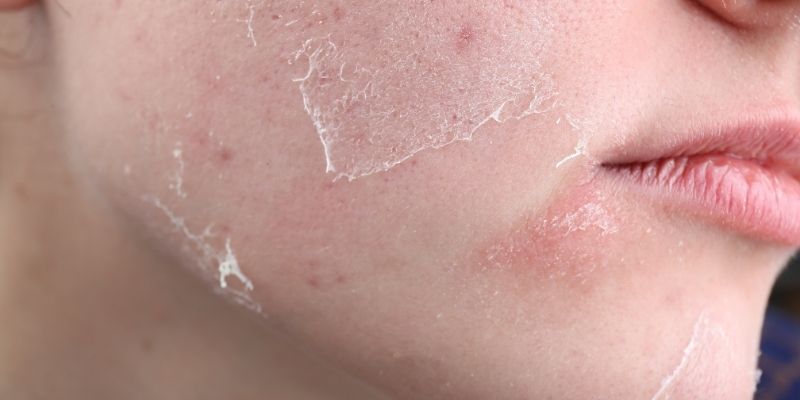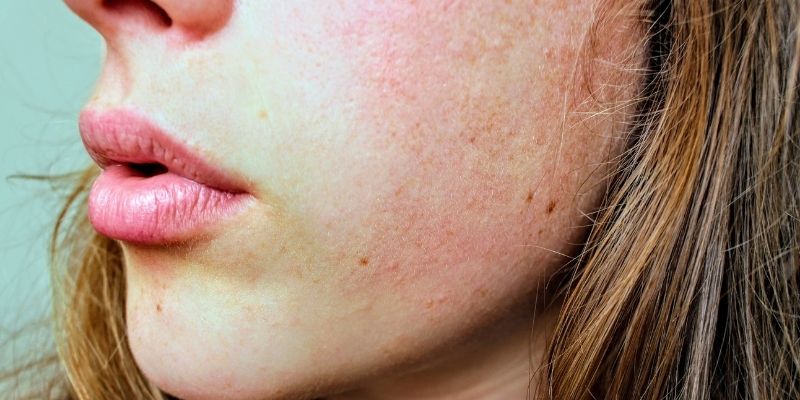Dry Skin Explained: A Doctor Answers 5 Common Questions
Dry skin may irritate, itch, and peel at all ages. Dry skin may not seem like a big deal, but it may cause irritation, inflammation, and infections if left untreated. Environmental changes, poor behaviours, and medical conditions may cause dry skin. Know what causes dry skin and how to treat and prevent it to keep it moisturized. This section discusses dry skin, how to avoid it, how to choose a lotion, how to eat and stay hydrated, and medical treatment.

Understanding Dry Skin
All ages and skin types may have xerosis or dry skin. Rough, dry, itchy skin aches and looks horrible. Maintaining healthy, moisturized skin and knowing dry skin's origins, symptoms, and treatment are important. Dry skin may result from lifestyle, environmental, and health conditions. Low humidity, cold temperatures, hot showers, and strong soaps dry and irritate skin by stripping it of oils. Older folks produce less oil, causing dry skin.
Tight skin after bathing or swimming suggests dry skin. Ashy, gritty, or dull skin wrinkles. Red, itchy, and bleeding dry skin may cause discomfort and sickness. Find out what causes dry skin and remedy it. Regular use of emollient-rich lotions and ointments rebuilds the skin boundary. Use mild, scent-free cleansers, cold baths, and a humidifier to avoid dry skin. Water and a diversified diet with vitamins and omega-3s promote good skin.
Your Dry Skin: Why?
Before treating dry skin, you must understand its causes. External and internal sources may cause dry skin. Weather causes the skin to dry out. Dry winter air removes moisture from the skin. Heating indoors dries the air and skin.
Hot showers and baths feel good but may dry and irritate skin by removing its oils. Individual age matters. Our skin retains less water as we age because it produces less oil. Due to decreased oil production, older people are more likely to have dry skin.
Dry skin might also result from health issues. Eczema, psoriasis, diabetes, thyroid, and renal issues might affect skin water retention. Antibiotics, diuretics, and acne treatments may dry skin. Lifestyle determines skin health. Dry skin may result from smoking, drinking, and poor diet. Identifying the main problems helps concentrate treatment and prevention.
Ways to Prevent Skin Dryness
Once the causes of dry skin are understood, prevention is essential. To prevent dry skin, you need a comprehensive strategy that addresses inner and outer issues, not just lotion. Changing your bathing regimen is wise. Protect your skin's oils with a 10-minute hot shower or bath. Use fragrance-free, mild cleansers to prevent skin irritation and moisture loss.
Moistening after bathing is essential. Thicker lotion on wet skin seals in moisture and improves the barrier. Hyaluronic acid, ceramides, and glycerin moisturize skin. Also significant: environmental changes. Dry weather humidifiers minimize skin evaporation. The face is protected year-round with waterproof and sunscreen clothing. Skin health depends on nutrition and drink. Drinking water daily keeps the skin soft. Antioxidants, omega-3s, vitamins A, C, and E, and other nutrients support the skin's natural layer.
The Best Dry Skin Products
Choosing the correct skin care products prevents and treats dry skin. Try one of numerous dry skin cures. Use gentle, soap-free cleaners. Drying perfumes and sulfates should be avoided. Hydrate or moisturize.
Apply moisturizer on dry skin. Ointments and creams retain moisture better than lotions owing to oil. Hyaluronic acid attracts water, whereas ceramides reinforce the skin's barrier. Glycerin and urea moisten. Dry, sensitive skin may benefit from petroleum jelly. These thicker, greasier products prevent dryness by retaining moisture.
Exfoliating is essential but delicate. Gentle exfoliants exfoliate dead skin and renew cells. Too much exfoliation may dry and damage the skin. Exfoliate moderately with mild AHA or lactic acid once or twice a week. SPF is needed for dry skin. Broad-spectrum sunscreens with 30 SPF prevent UV damage and skin dryness. Sunscreens for dry or sensitive skin hydrate.

5 common dry skin questions
My skin seems dry—why?
Skin that loses water faster than it repairs becomes dry and flaky. This illness has several causes. Dry, cold winter air may cause rough, uncomfortable skin. Hot showers or baths eliminate skin oils. Skin becomes dry when strong cleansers and soaps eliminate natural oils. Dry skin is more frequent in elderly adults because their skin generates less oil. Dry skin may arise from eczema, psoriasis, diabetes, thyroid disorders, and renal sickness.
How do I prevent dry skin?
To avoid dryness, feed and maintain your skin's moisture barrier regularly. Take shorter, warmer showers or baths to avoid removing essential oils. Use mild, fragrance-free cleaners to prevent skin dryness. To retain moisture, use a heavy moisturizer after bathing and keep it on the day. Heating may dry out your home, especially in winter or hot climates. Finally, drinking water moisturizes your face.
How should I choose a moisturizer?
Your face needs to decide the best lotion. Ointments are great for dry or cracked skin and keep water out despite being greasier than lotions or creams. Lotions are lighter and better for average to slightly dry skin, whereas creams absorb and hydrate severely dry skin. Thicker, odourless lotions containing hyaluronic acid, ceramides, or glycerin moisturize. To avoid skin drying and irritation, prevent artificial smells.
Can diet affect dry skin?
A diet may impact skin water content. Omega-3s in fish, flaxseeds, and walnuts revitalize and protect skin. A, C, and E help skin cells heal and avoid oedema. Processed food, sweets, and bad fats may dry and irritate skin. Internal hydration keeps your face elastic and moist.
Dry skin: When should you see a doctor?
Some dry skin requires medical treatment, but most may be handled at home. If your skin is dry after moisturizing, itchy, red, swollen, cracked, and bleeding, you may have eczema or psoriasis. Dry pus or fever need medical attention. Professional diagnosis is necessary since chronic dry skin may signal thyroid or diabetic concerns.
Conclusion:
Healthy, well-hydrated skin needs the right products, lifestyle changes, and sometimes professional help. Knowing what causes dry skin and making simple efforts to avoid it, such as using mild cleansers, moisturizing frequently, and drinking enough water, may reduce dryness and pain. Diet and environment affect the skin. Consult a doctor if home remedies don't work for dry skin. Smooth, moisturized skin is feasible with the proper treatment.












